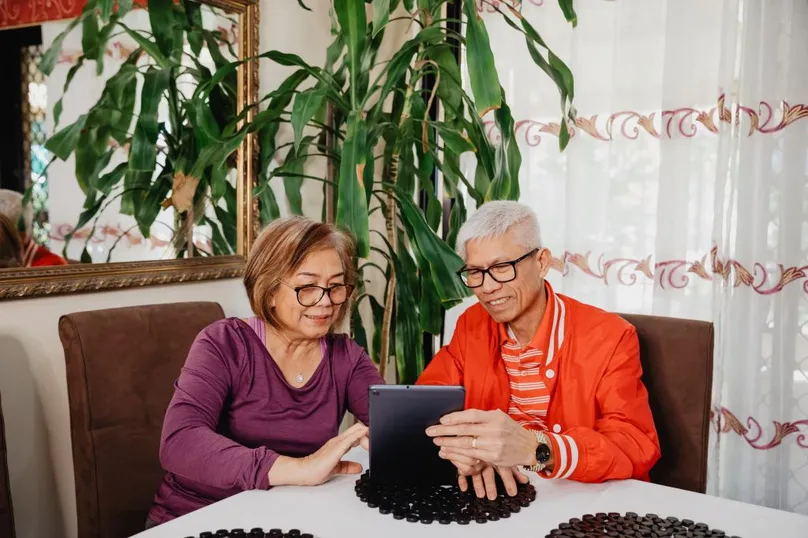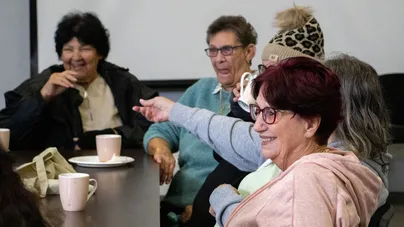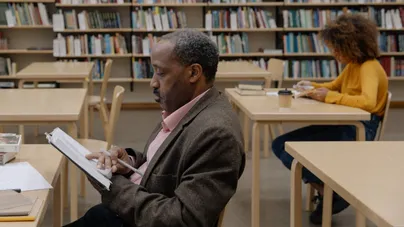Learn why support groups matter, how they can help, and where you can find them.
Support groups are more than just a space to talk. They can offer comfort during life’s tougher moments and a strong sense of connection when things are going well. This guide explains what support groups are, how they can support your mental and emotional health, and how to find one that’s right for you.
What are support groups?
Support groups bring people together who are experiencing similar challenges. These common challenges could be anything from grief, a specific health condition, or a life transition like retirement. Whatever the situation, the goal of support groups is to offer emotional, social, or practical support in a safe and understanding space.
Support groups aren’t only for those going through emotional difficulty. They can be a proactive way to protect your mental health, build connection, and find purpose – especially during times of change. You might join a group to share, listen, or simply feel less alone.
Watch Barrie’s story

Learn how Barrie's been navigating his experience with loss.
In this short interview, Barrie shares his experience of grief following the loss of his wife. He speaks about the importance of staying socially active: ‘Keeping busy, working and things like that, trying to be involved in lots of things – that’s what’s keeping me going.’
Barrie’s resilience comes not just from within himself, but also from the people he chooses to connect with. He joined a walking group organised by his wife’s palliative care service. He found that talking with others who were also navigating loss made a difference: ‘Being able to relate to people on the same page as me,’ he explains, ‘that’s been good.’
Support groups come in many forms: sit-down-and-chat, walk-and-talk, or activity-based like crafting or gardening. Sometimes just being around others who’ve been through something similar can help you feel seen and supported.
Mental and emotional benefits of support groups
Support groups can help you:
- Reduce feelings of isolation
- Find comfort in shared experiences
- Learn practical coping strategies
- Feel a greater sense of community, belonging, and purpose
Community and social connections are important to both your mental and physical health. In fact, social networks are as important to your health over your lifespan as diet and exercise are. The connection and sense of community support groups offer are therefore incredibly valuable. These benefits can be especially helpful after major life events like a loss, diagnosis, moving house, or retiring.
For example, a 2024 study showed that older adults who joined support groups experienced a significant reduction in ‘retirement syndrome’. Retirement syndrome is a cluster of feelings like emptiness, loneliness, and uncertainty that can arise after leaving work. Participants reported improvement in all aspects of this experience after joining a group.
By supporting your social and mental health, support groups can improve your overall quality of life.
Types of support groups
Support groups are available for a wide range of experiences, including:
- Grief and loss
- Chronic health conditions
- Mental health support
- Social isolation
- Carers and family members
Some groups are informal and friendly, others are more structured. You might prefer one that’s peer-led, or one run by a professional. Many are now available online as well as in person, so you can choose the setting that suits you best.
Tip: If you're feeling unsure, contact the organiser first to learn more before attending.
How to find a support group for you
You can find support groups in lots of different ways:
- Ask your doctor or health provider for a referral
- Check with your local community centre
- Browse the LiveUp activities database
- Search social media or local council pages
- Look into faith-based groups, if that aligns with your values
Reaching out is a sign of strength
It’s normal to feel nervous or unsure at first. Just showing up and listening, even if you don’t speak right away, is a big step.
Many people find that once they’ve taken that step, the benefits follow naturally. These benefits include feeling seen, supported, and connected.
Take the first step, reach out, and explore available support groups near you.
If you feel you may need more specific support, get in touch with your healthcare provider to find out what other options may be available.
Get in touch with LiveUp
Not sure where to start? LiveUp is here to help by proving free information tailored to your needs.
- Call us on 1800 951 971
- Try the LiveUp quiz to see what supports might suit you
- Search the LiveUp activities database for support groups near you
References
Vassiliadis, K. (2016, January 4). Social networks as important as exercise and diet across the span of our lives. The University of North Carolina at Chapel Hill - Health and Medicine News. https://uncnewsarchive.unc.edu/2016/01/04/social-networks-as-important-as-exercise-and-diet-across-the-span-of-our-lives/
Qorbani, S., Majdabadi, Z. A., Nikpeyma, N., Haghani, S., Shahrestanaki, S. K., & Poortaghi, S. (2024). Qorbani, S., Majdabadi, Z. A., Nikpeyma, N., Haghani, S., Shahrestanaki, S. K., & Poortaghi, S. (2024). The effect of support group participation on retirement syndrome in retired older adults: A randomized controlled trial. BMC Geriatrics, 24(1), 155. https://doi.org/10.1186/s12877-024-04923-4
How to use this information
LiveUp provides free information to help you make informed decisions about your health. This information is for general and educational purposes only, is not intended to provide a comprehensive guide, and does not replace medical advice. Everyone is different, so some of these tips may work better for you than others. You should use your own judgment and seek medical advice when applying this information to yourself, to determine if it is suitable in your circumstances. Your use of, or reliance on, this information is solely at your own risk. Independent Living Assessment Incorporated is not responsible or liable for any injury, loss, or damage caused as a result of your use of, or reliance on, this information.
Download and print this article:
You can print out the PDF and stick it to your fridge or file away the tips to revisit at a later time.

Read more Mental health articles
Did you enjoy this article? You may also like reading similar healthy ageing articles.
See all Mental health articles

